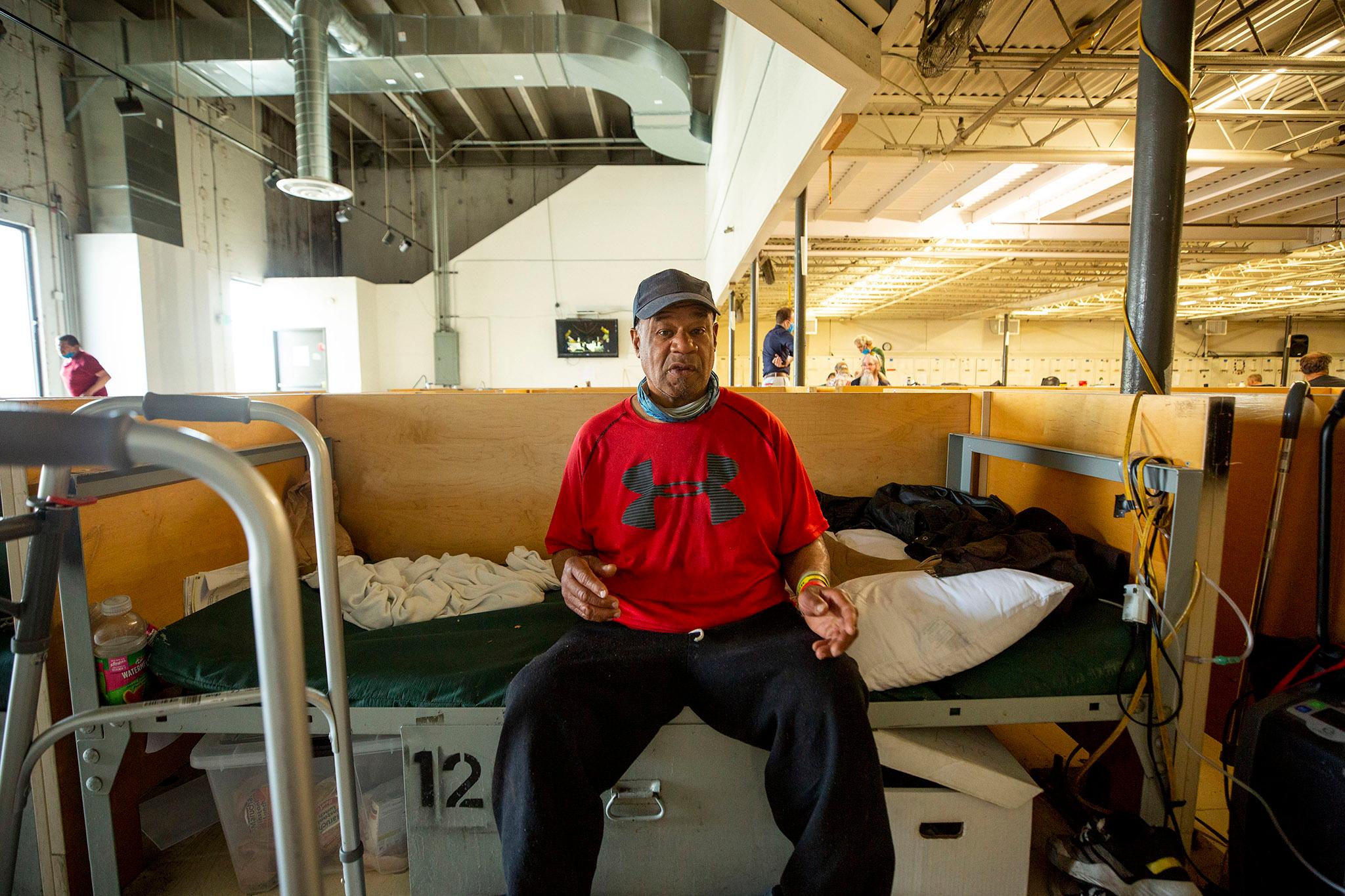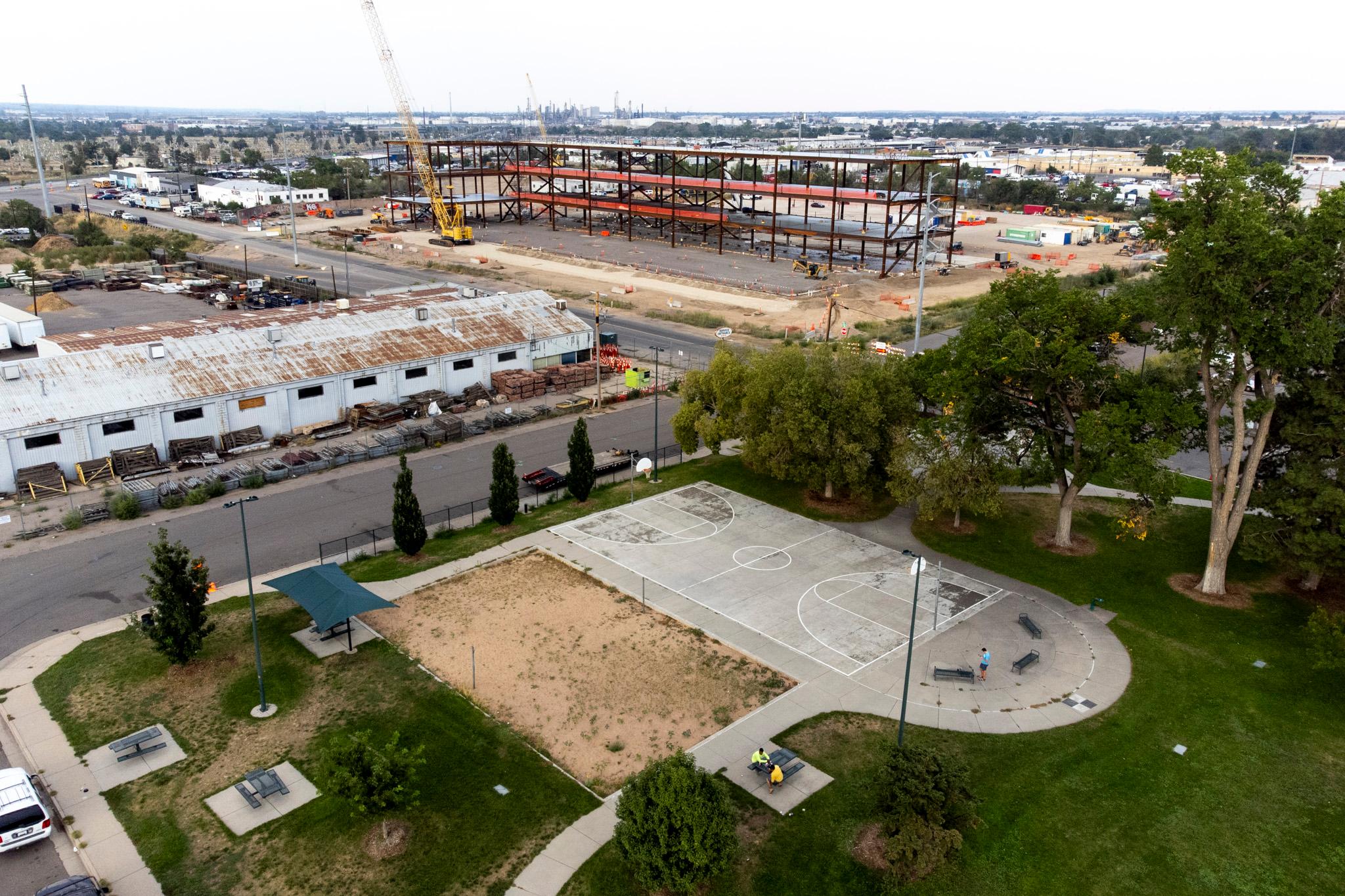Updated at 3:58 p.m. on Monday, June 16, 2025
“The Salvation Army is inhumane!”
Dozens of advocates and former guests of The Salvation Army’s shelters in Denver shouted those words outside the charity’s regional headquarters in April. Passersby gawked as dozens of people marched outside the brick building.
The organization had shuttered the office ahead of the protest, but one remaining staff member listened from inside.
The protesters’ demand: Denver, defund The Salvation Army.

It was the latest escalation of a campaign against the organization, which is one of the largest providers of homelessness services in Colorado’s capital. And the criticism has gained traction — not just in advocacy circles but in city hall.
Over the past few months, Denver City Council members and other officials have considered cutting back on the city’s reliance on the century-old charity. Meanwhile, The Salvation Army has been working without pay, piling up millions of dollars in IOUs as city officials have delayed multiple contract approvals.
Just days before the April protest, the council killed a contract for rehousing homeless families with the charity — and the relationship has only grown more tense in the months since.
The longstanding homeless service organization serves up to 1,800 people per day, including an average of 300 children a night. It has taken on a lion’s share of Mayor Mike Johnston’s effort to end unsheltered homelessness.
But now, the charity is facing “financial hardship” and “cashflow problems” as a result of city leaders’ delays, according to Salvation Army spokesperson Jennifer Forker.
City officials have even requested competing proposals to run Denver’s shelters in 2026, potentially replacing The Salvation Army.
Meanwhile, residents have complained about murders, stabbings, assaults, and bedbugs in The Salvation Army shelters that warehoused people “like cattle,” as former shelter guest Ana Miller described it. The homelessness advocacy group Housekeys Action Network Denver accused the charity of “profiting from pain” — an allegation that the charity denies.
“The Salvation Army has been losing money operating these programs for the city,” Forker said. “We are definitely not making any profit. Zero profit. That’s not what this work is about.”
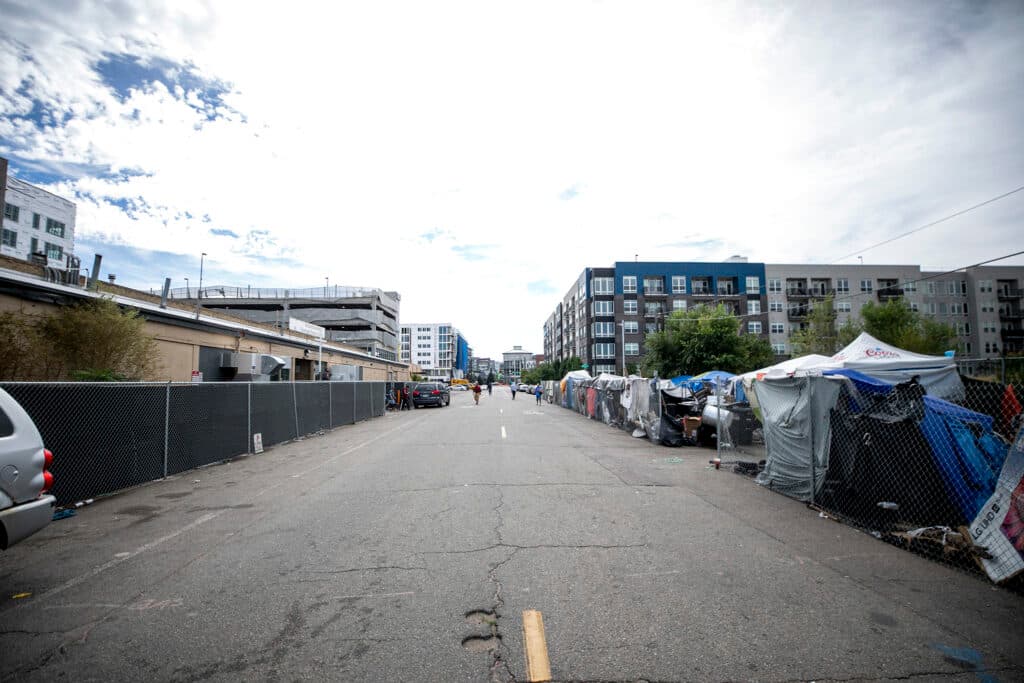
As a religious organization, The Salvation Army is not required to publish its full financial statements beyond certain data it’s required to share with the city.
For many employees of the organization, the onslaught of criticism has felt unwarranted and unfair. They face the never-ending work of sheltering and housing, relentless questions from reporters and criticism from across the political spectrum.
“While we don’t presume to do this work perfectly, we expect our critics to stick to the facts,” Forker said. “It does no one any good to perpetuate misinformation.”
A century-long relationship has grown in recent years.
The private, Bible-based evangelical Christian ministry is on a quest to spread “the good news about Jesus Christ and to invite others to become his followers too,” according to The Salvation Army’s website.
The group has been addressing homelessness in Denver since 1887 — eleven years after Colorado became a state and one year before the Brown Palace Hotel began construction.
For years, the organization operated independently of the city, raising funds through major donors and Christmas-time bell ringing. But its relationship with the city of Denver began to expand under Mayor Michael Hancock.
After the city passed its urban camping ban in 2011, the local government relied on The Salvation Army’s Crossroads shelter to host hundreds more people, and the city began funding the work.
The shelter on Arkins Court and 29th Street has a longstanding reputation among unhoused people as a loud, crowded and challenging place to stay, with city officials saying in 2017 that poor maintenance and overcrowding could have resulted in a ”major loss of life” if there had been a fire.
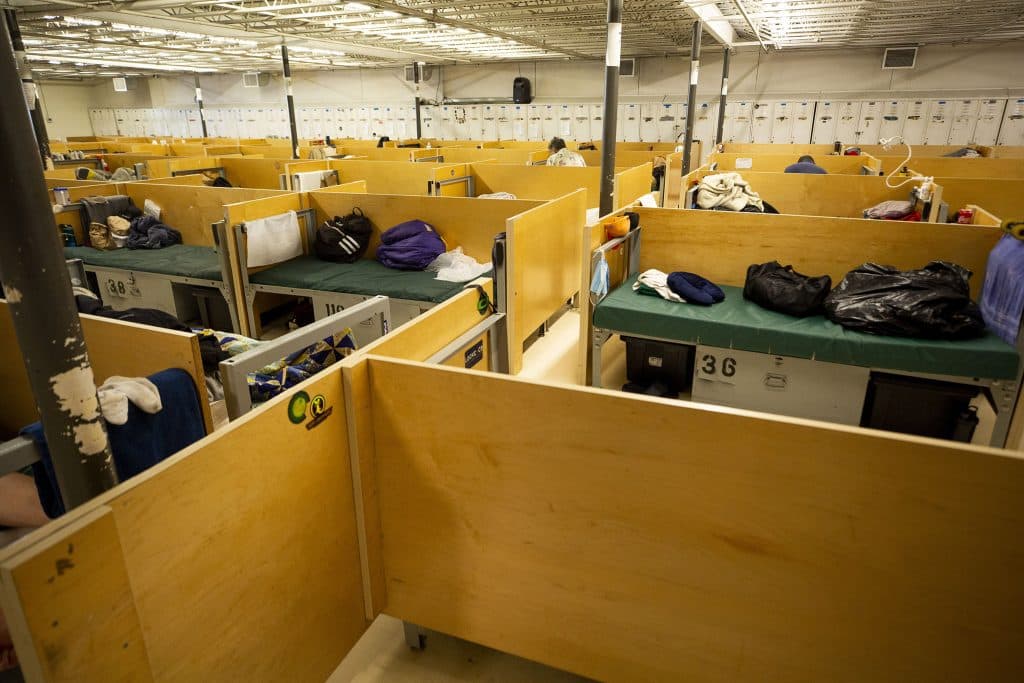
In 2019, Denver purchased Crossroads from The Salvation Army for $10.5 million, though the city continues to contract with the charity to manage it.
Even today, Councilman Paul Kashmann described the Crossroads group shelter as a “horrible” space. In contrast, The Salvation Army reports a client satisfaction rate of 70 percent at Crossroads.
Over the years, as housing prices and the number of people living outside rose, The Salvation Army’s work in Denver expanded.
Since 2020, the city has spent $155.7 million on contracts with the group. About half that sum came in 2022 during the COVID emergency response, but spending on The Salvation Army has remained elevated as Johnston has tried to address high levels of post-pandemic homelessness.
In 2023, Johnston launched the program now known as “All In Mile High,” an effort to end unsheltered homelessness in Denver in four years. The Salvation Army signed tens of millions in contracts to handle much of the work.
The mayor rushed to bring 1,000 people living outdoors indoors in just six months, and The Salvation Army had to add staff quickly to keep pace, primarily to run “hotel” shelters that opened as part of the effort.
Criticisms of the charity have grown since the pandemic.
City officials have received complaints about safety and health issues at the “All In” shelters from the beginning — particularly the former Best Western in Northeast Park Hill. The Salvation Army runs the facility and the Denver Housing Authority owns it.
City workers have responded to more than 500 general service requests at the shelter, addressing asbestos, a collapsing roof, rodents, flooding, broken walls and locks, and malfunctioning air conditioning. (The city is responsible for the upkeep of the facility, not The Salvation Army.)
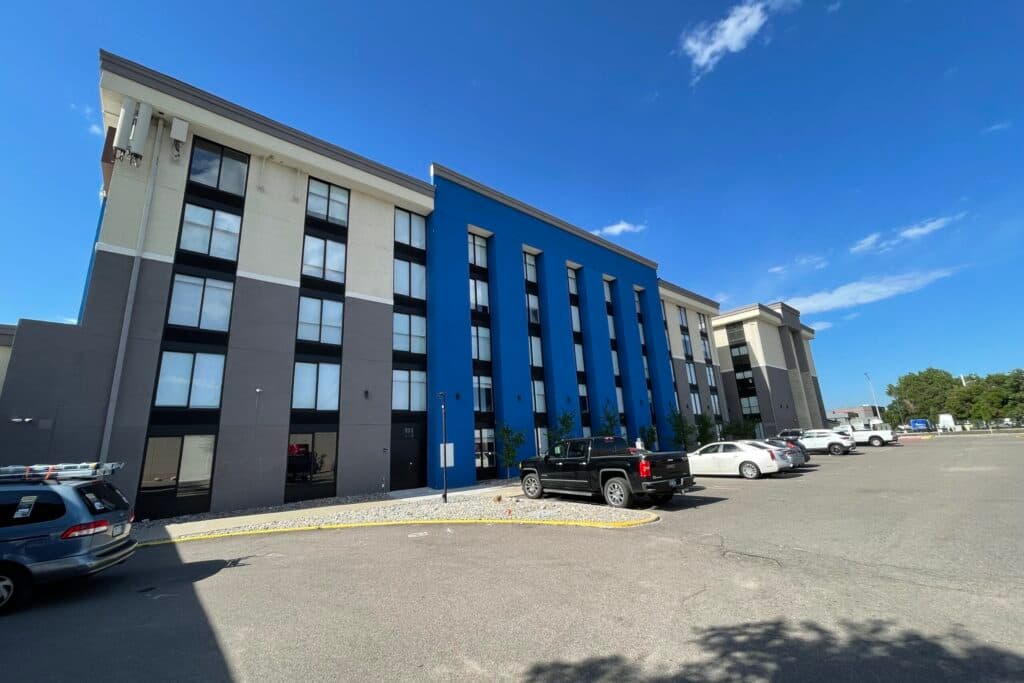
Guests complained of skin conditions, respiratory problems and other health issues.
Others told Denverite about drug abuse and the sales of substances that made sobriety challenging.
A director with The Salvation Army outlined some of the problems in an email to homelessness advocate Terese Howard of Housekeys Action Network Denver after Howard inquired about why the laundry machines had been broken down for months.
“In addition to historical flooding issues, the building has experienced new and significant damage due to flooding,” the director wrote. “This facility is the most challenging out of all of the hotels The Salvation Army operates on behalf of the city.”
The director wrote that city workers were “stretched thinly and unable to make this issue the top priority.”
Twenty-five people have died at “All In” shelters operated by The Salvation Army: two murdered, one by suicide, three of natural causes and the other 19 from drug overdoses, according to the Denver Department of Public Health and Environment. How many of those people were shelter guests is unknown.
In 2024, The Salvation Army failed to provide security at a shelter, though it had been contracted to do so — the same former DoubleTree shelter where a double homicide took place. The city eventually took over providing security, and there have been no more homicides.
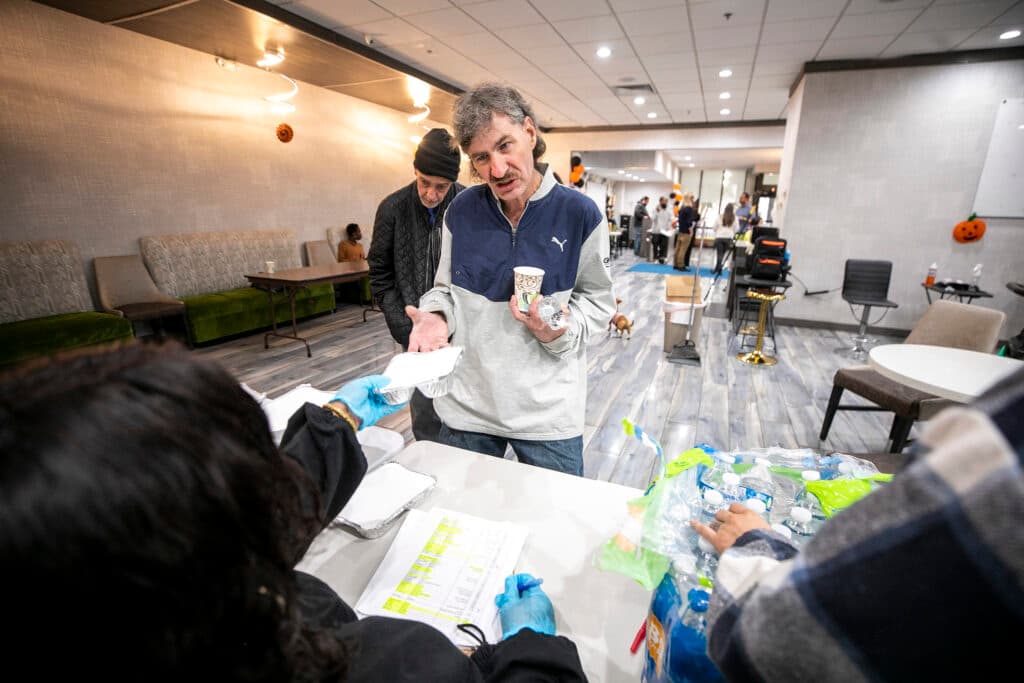
Sheltering thousands of people a year is a messy business that comes with enormous challenges. Shelter guests are often at the lowest points in their lives, suffering from trauma, mental health issues and addiction, without anything left in the world. When they come inside, they bring that trauma with them.
“We have guests who need very little support, who just need an opportunity to work their way back into housing, and we shelter people who are struggling and have complex needs,” Forker said. “We help all these people, but if someone is struggling, we push harder to provide them with as many supportive services as possible. This often requires reaching out to partner agencies in town.”
The Salvation Army estimates that at one hotel alone, staff saved 165 lives using CPR and opioid overdose reversal drugs since December 2023.
“The Salvation Army is doing some very heavy lifting for the city, and it’s our pleasure to do so,” Forker said. “Serving our neighbors in need is what we are called to do. We care deeply for all people. And everyone, regardless of their circumstances, deserves a chance to thrive.
“We shelter dozens of families, including about 300 children every single night. We’re helping children to get vaccinated and to attend school,” she continued. “We’re helping their parents find housing and jobs. This is critical work we’re doing, and it’s difficult work. We’re doing it with faith the city will come through with the $5 million it owes for services already provided this year.”
Mayor Mike Johnston stands by The Salvation Army.
“We are a better city today for the efforts of The Salvation Army,” Johnston said in a statement in April. “The Salvation Army performs a difficult job at an extremely high level, and I know they are as committed to accountability and improvement as they are to our shared mission of ending unsheltered homelessness in Denver.”
Despite those supportive words, the Johnston administration has not gotten the organization paid for the vast majority of its 2025 efforts.
The Salvation Army is tapping its reserves and has fronted the city $5 million of work while officials try to finalize contracts.
So far, the full Denver City Council has only reviewed three contracts from the charity — a small portion of what needs to be finalized. On Thursday, the housing department submitted contracts for another $19 million in funding for the charity to manage three shelters, nearly six months after work began.
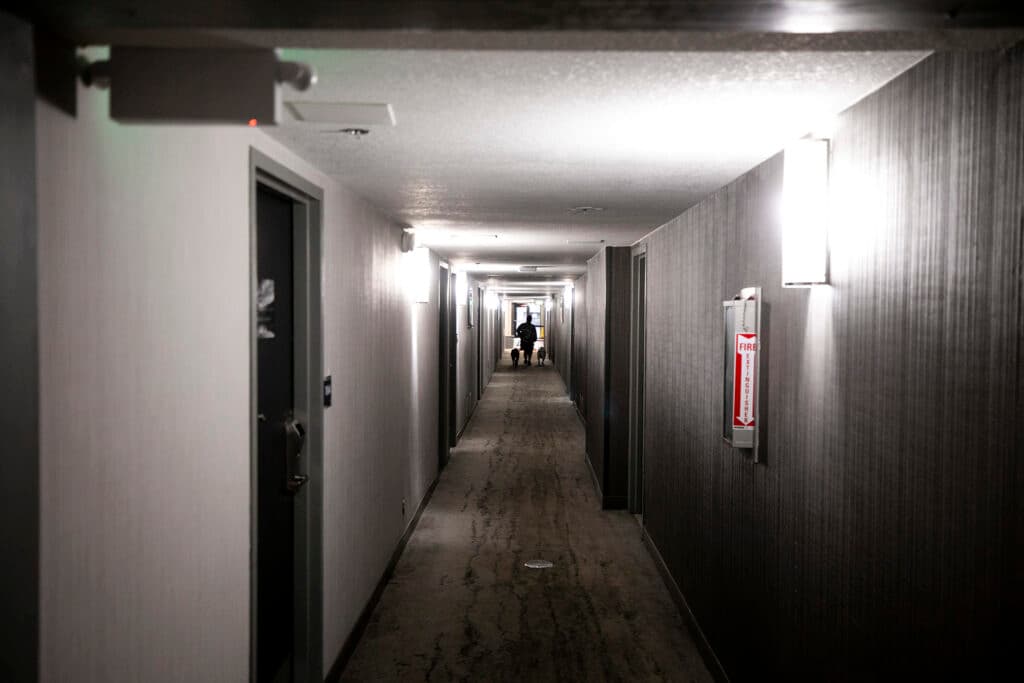
The approval process takes weeks and could drag on even longer with council resistance. And there’s no guarantee the contracts will pass.
The city council has already rejected one contract that would have given The Salvation Army more than $3 million in funding for rapid rehousing for 50 families experiencing homelessness. The council, citing a lack of confidence in the charity, voted the contract down in early April.
The city’s housing department submitted a separate contract to the council in May. It would pay for The Salvation Army to continue running Crossroads, a group shelter for men. The contract passed through the committee after a heated debate.
But the mayor's office filed the contract with the full council past the deadline for a recent meeting, requiring council to unanimously approve adding the item to the agenda. Two members, Shontel Lewis and Sarah Parady, refused to rush through the contract and pushed back a vote to this Monday, June 16.
The Salvation Army also runs the Lambuth, Tamarac, Stone Creek and Aspen hotel shelters, where unhoused residents are provided with rooms with doors. Only the Lambuth shelter contract for 2025 has been finalized by the council.
Some city officials and council members who once voted for contracts with The Salvation Army now oppose them.
Councilmember Parady told Denverite she would not vote for another long-term shelter contract with the group without significant changes.
“I have heard from an increasing number of whistleblowers with a variety of experiences with TSA who have raised grave concerns about harms to guests (and staff) at Denver TSA shelters,” Parady wrote Denverite.

She does believe The Salvation Army should be paid for completed work.
“I am open to approving short forward-looking contracts that are part of a plan to transition services or contracts that do not involve shelter operations,” she added. “Beyond that, I cannot vote ‘yes’ on continuing with this provider without significant new safeguards.”
Councilmember Lewis, whose District 8 houses many of the All In Mile High shelters, questioned the organization’s transparency after The Salvation Army denied her request for a tour in October 2023, when she showed up unannounced, with Denverite, to investigate shelter guests’ safety concerns at the former Best Western.

She asked why she couldn't walk through a facility she would be asked to fund. She was told it would violate guest privacy. Lewis responded it was guests who wanted her there in the first place.
Public records also show occasional tension between The Salvation Army and the mayor’s office. When issues arose at the shelters, city officials and Salvation Army staff punted responsibility back and forth, trying to clarify who should fix what as guests waited for solutions.
And when The Salvation Army floated an idea about laundry trucks in a conversation with a local activist, the mayor’s office was unhappy to be left out of the loop.
“This is the first time I’m hearing the recommendation and request that you shared here and don’t particularly appreciate you sharing it publicly before bringing it to me first,” Cole Chandler, the mayor’s adviser on homelessness, wrote in an email.
In March, after a Salvation Army staff member with a criminal record allegedly sexually assaulted a guest, the mayor's office and HOST paused contract negotiations, according to city spokesperson Jon Ewing.
“When a guest is harmed, you absolutely must work through procedures and policies to ensure you’re doing everything in your power to ensure it never happens again,” Ewing said.
The contract for the Crossroads shelter is up for renewal – and it’s not going smoothly.
HOST has recently been making its case to the city council for why The Salvation Army should continue to operate Crossroads.
Last year, the shelter served 1,194 individuals. Of those, just 69 had “positive exits,” a result of shelters not having direct access to funding for re-housing, as the housing department’s Deputy Director of Housing Opportunity Jeff Kositsky recently explained to the council.
Still, he described it as “the most popular congregate shelter in Denver.” It’s more than 98 percent full on average. And many people live there year-round, forming a close-knit community with little hope of a path toward housing.
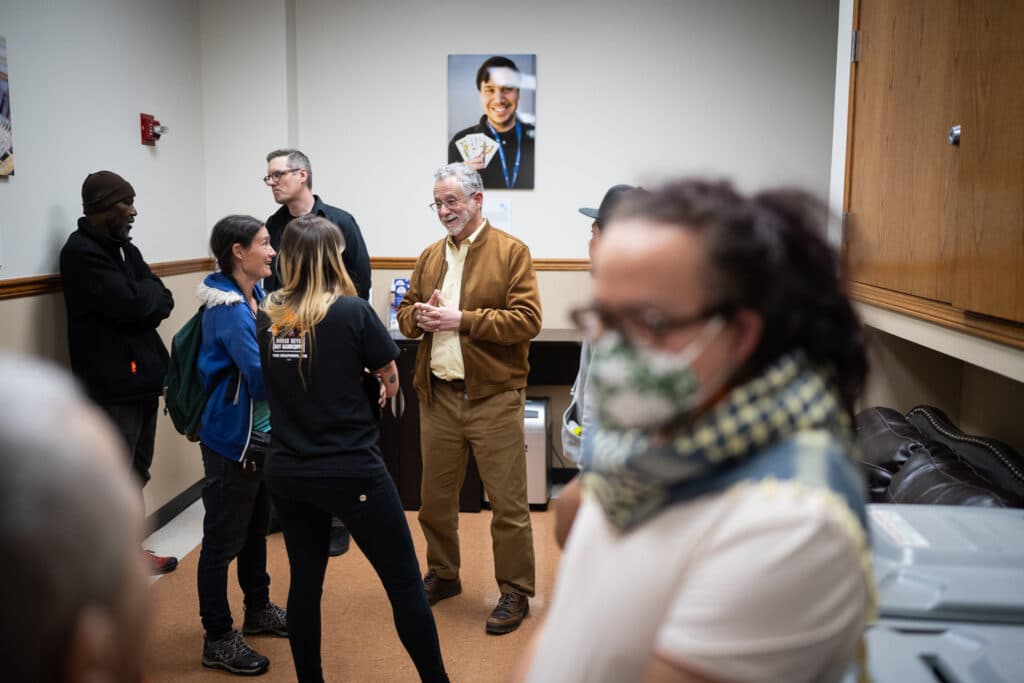
“Excuse me for being a bit cranky, but to call Crossroads popular doesn't sit well,” Councilmember Kashmann replied. “Most used, perhaps, but that is not a desirable building.”
“I apologize for the use of the word ‘popular,’” Kositsky said. “When I go into that shelter, there’s a sense of community that exists there that doesn’t exist in all of our shelters.”
City officials acknowledge the old warehouse is not an ideal shelter and are considering moving the operation.
Meanwhile, The Salvation Army has been operating the shelter without pay or a contract. The proposed contract would last through the end of the year, and would cost the city an additional $4.5 million, including for work already done over the year. The total contract, if approved, will be $19.3 million.
HOST acknowledged both the city and The Salvation Army have received “numerous complaints regarding the operation of programs run by TSA.” Both are working to address those issues.
If the council rejects the contract, city staff would likely take over shelter operations — just as they’re facing layoffs and furloughs. The city would launch an emergency procurement process for a new partner to operate the shelter.
“I’m not going to lie,” Kositsky told the council. “That would be incredibly disruptive if that were to occur.”
Council members are demanding changes.
Councilmember Darrell Watson wants a “good neighbor agreement” between The Salvation Army and neighbors, largely residents living in an upscale new development nearby. The Salvation Army is amenable to that.
The Salvation Army has agreed to a swath of new regulations under the proposed contract: monthly visits, contract monitoring, corrective action plans for performance issues, monthly meetings, customer satisfaction surveys and more. Some of these were recommended by The Salvation Army itself.
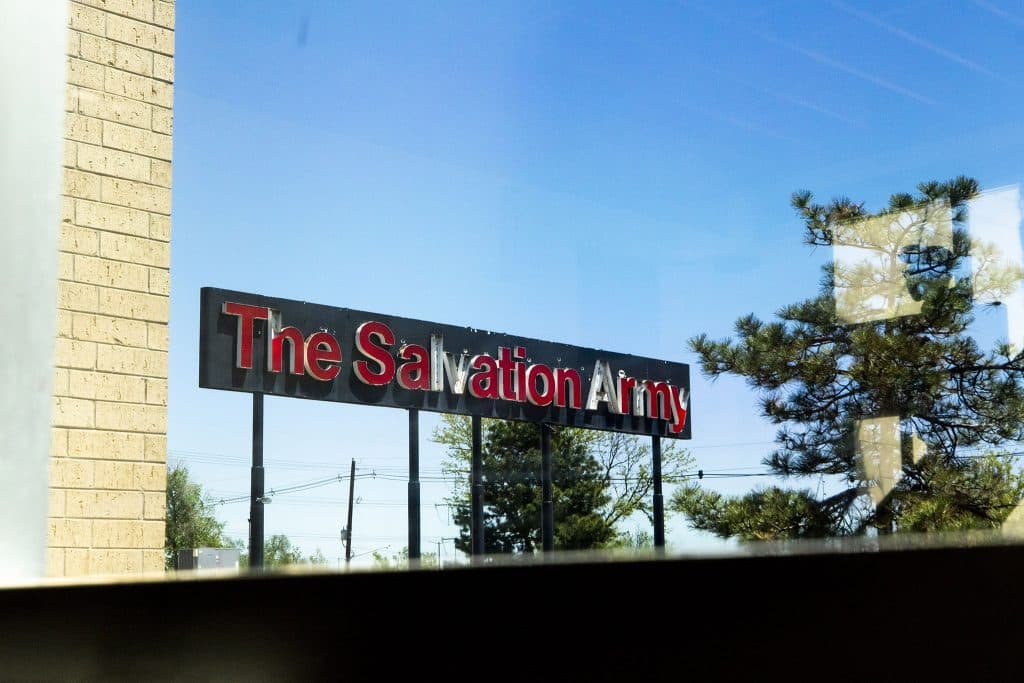
The debate is raising tensions among city officials, too. Some city council members say the long delays for homelessness contracts point to poor management by the Johnston administration.
“I don't like having to pay in arrears like this,” City Council President Amanda Sandoval said as the Crossroads contract was debated in committee. “It's really bad practice.”
The Salvation Army is not the only All In Mile High partner to work without a signed contract.
Earlier this month, the city finally signed a contract with the Colorado Coalition for the Homeless, months after work had begun, for health services at non-congregate shelters.
“We're bad business partners,” Sandoval said. “To not pay someone for four months, you would go to collections in the real world.”
She warns that the city’s slow contracting process could also be preventing other, smaller nonprofits from providing services, since they can’t afford to work without pay. HOST has promised to move faster in the future.
The city started working on contracts for 2025 in October 2024, too late to finalize them and send them for city council approval before the work started.
“The delays are both unfortunate and frustrating,” wrote Ewing, with the mayor's office. “We had some concerns we needed to work through with The Salvation Army and City Council, and we are looking forward to getting these contracts approved as soon as possible.”
As the mayor's office sees it, the blame for slow approvals is shared.
“The Salvation Army is also a very large organization and has its own process for executing contracts that can sometimes take longer than our smaller partners,” Ewing said. “Either way, we’re committed to getting this done.”

Meanwhile, even bigger changes could be on the way. The Salvation Army’s shelter contracts are up for a standard competitive bidding process for 2026.
It opens the possibility the city will hire other nonprofits to do the work in the future, and some city council members are pushing for that to happen.
But it's unclear whether any groups are applying for the chance — or whether any are large enough to replace The Salvation Army.
Update: Councilmember Kevin Flynn postponed a vote on the funding of the Crossroads shelter to next Monday, June 23.

